Key takeaways:
- Pro-life advocacy emphasizes empathy, compassion, and support for both unborn lives and mothers, fostering deeper understanding through personal connections and shared stories.
- Addressing opposition through active listening and respectful dialogue transforms potential conflicts into opportunities for growth and education.
- Framing conversations positively by highlighting common values can shift discussions from confrontation to collaboration.
- Successful interactions hinge on vulnerability and the willingness to engage with diverse perspectives, focusing on shared goals rather than ideological divides.
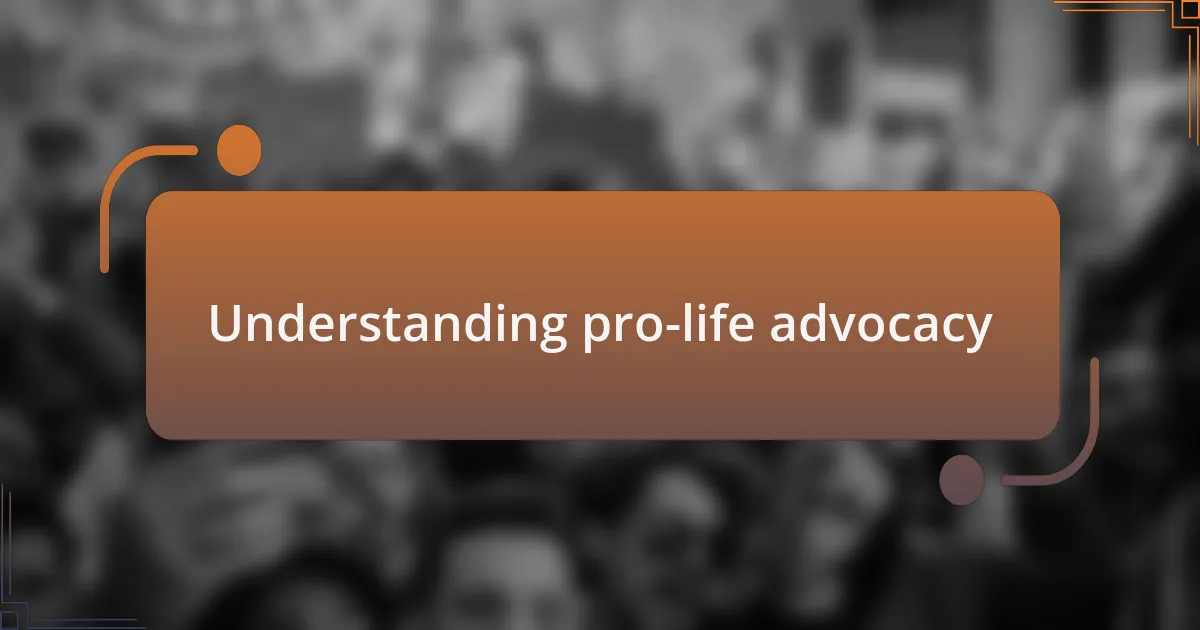
Understanding pro-life advocacy
Pro-life advocacy is rooted in the belief that every human life, regardless of its stage, deserves protection and respect. From my experiences attending rallies and engaging in discussions, I’ve felt the passion of individuals dedicated to this cause, truly believing they are defending the most vulnerable among us. It makes me wonder: how often do we stop to consider the impact of our choices on those who cannot speak for themselves?
Additionally, pro-life advocacy isn’t just about opposing abortion; it encompasses a broader commitment to supporting life in all its forms. I recall volunteering at a crisis pregnancy center where we provided resources and emotional support to expectant mothers. Witnessing their gratitude firsthand deepened my understanding of the compassion that lies at the heart of this movement. Isn’t it remarkable that the pro-life approach touches on both protecting unborn lives and uplifting mothers and families?
Moreover, the conversation around pro-life advocacy can sometimes lead to intense emotional responses. I remember a debate I participated in that revealed how different perspectives can be so deeply ingrained. It prompted me to reflect: what if we approached these discussions with more empathy? Understanding that at the core of such debates lie real fears and hopes can transform our engagement into something constructive rather than divisive.
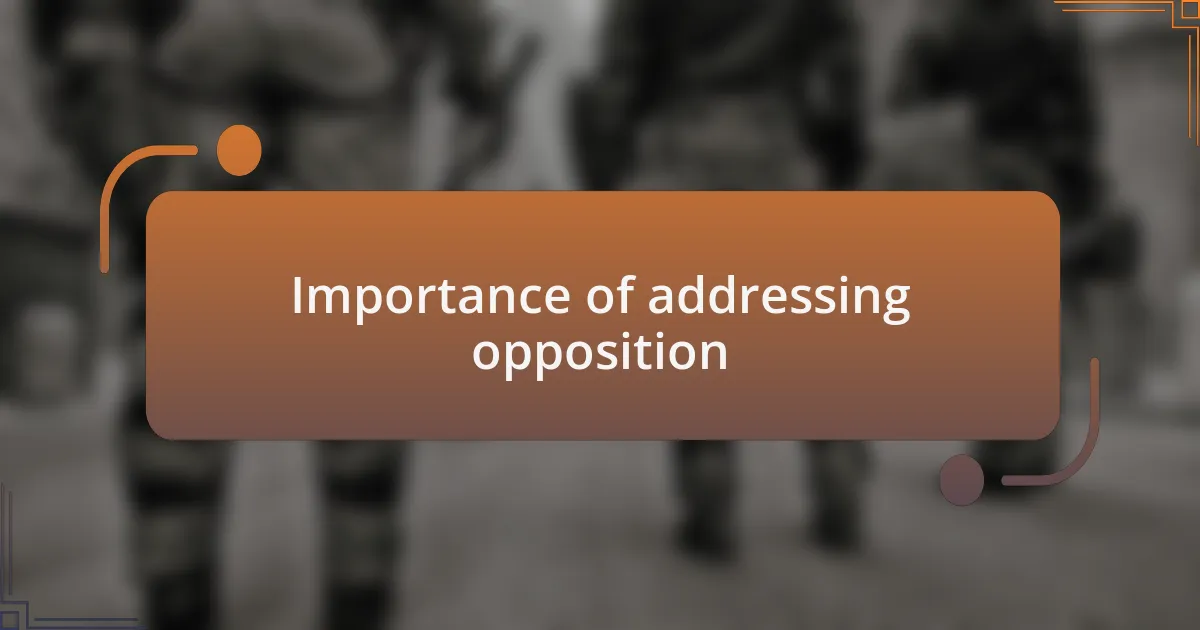
Importance of addressing opposition
Addressing opposition is crucial in pro-life advocacy because it allows us to clarify our beliefs while fostering understanding. I remember a discussion with a colleague who held a contrasting viewpoint; instead of shutting down, we explored each other’s perspectives. This dialogue opened my eyes to the importance of patiently explaining our stance, which ultimately helps bridge gaps in understanding.
When we confront opposition thoughtfully, it transforms what could be a heated debate into an opportunity for growth and education. I once engaged in a community forum where emotions ran high, but by acknowledging the concerns of those against my views, we ended up having a meaningful exchange. This showed me that when we approach discussions with respect, we can find common ground even amidst disagreement.
Moreover, effectively addressing opposition helps to debunk myths and misconceptions about the pro-life movement. Reflecting on past experiences, I’ve noticed that many people fear what they don’t understand. By addressing these fears directly, I’ve seen how even a small effort to explain our position can change hearts and minds. Isn’t it compelling to think that dialogue, when approached the right way, can lead to a powerful transformation?
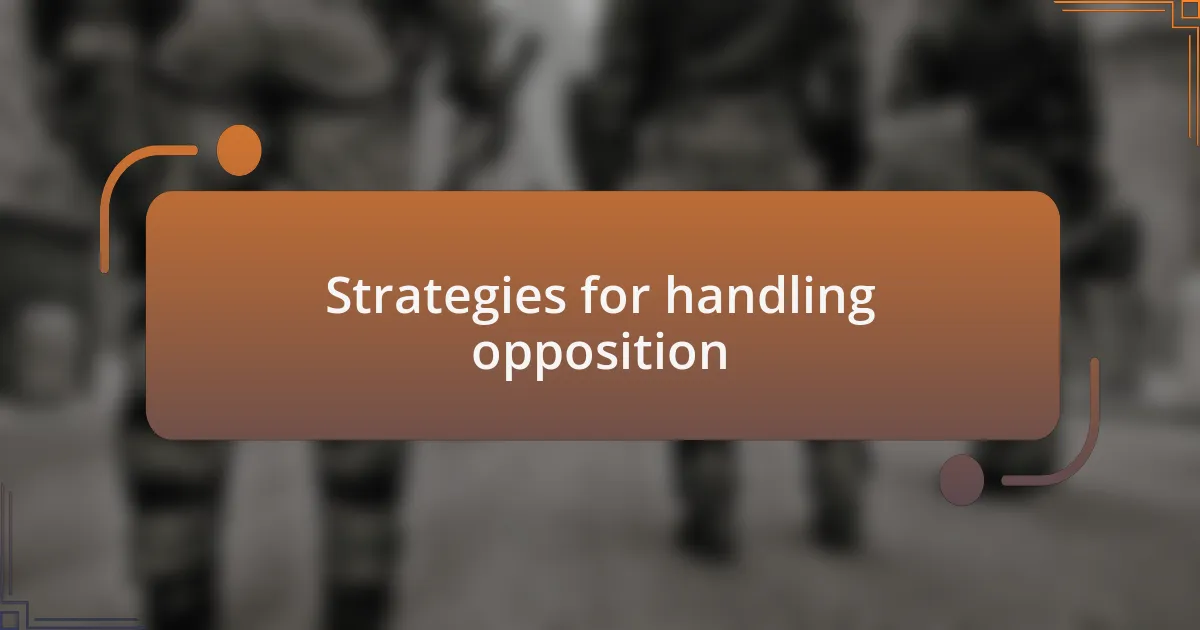
Strategies for handling opposition
When engaging with opposition, one strategy I found effective is to actively listen. I remember attending a debate where a passionate opponent shared their story about abortion. Rather than immediately rebutting their points, I listened intently. This not only allowed me to understand their perspective better, but it also created a rapport that made them more receptive to my view. Isn’t it interesting how listening can disarm hostility and open a path for constructive conversation?
Another approach I’ve adopted is to use personal stories that resonate with my audience. Sharing a heartfelt experience about what led me to advocate for life can humanize the issue. One time, during a discussion in my local community, I recounted a friend’s journey through a challenging pregnancy. The emotional weight of her story prompted others to reflect on the complexities surrounding life decisions. Doesn’t it seem that personal connections can transcend ideological divides, allowing for deeper understanding?
Lastly, I’ve learned the power of framing the conversation positively. Instead of focusing solely on the opposition, I tend to highlight the values we share, like compassion and the desire for support. During one particularly contentious dialogue, I began by acknowledging the desire for a safe space for women. By framing our common ground, I shifted the tone from confrontation to collaboration. Isn’t it rewarding to realize that finding unity, even in disagreement, can foster a more sophisticated dialogue?
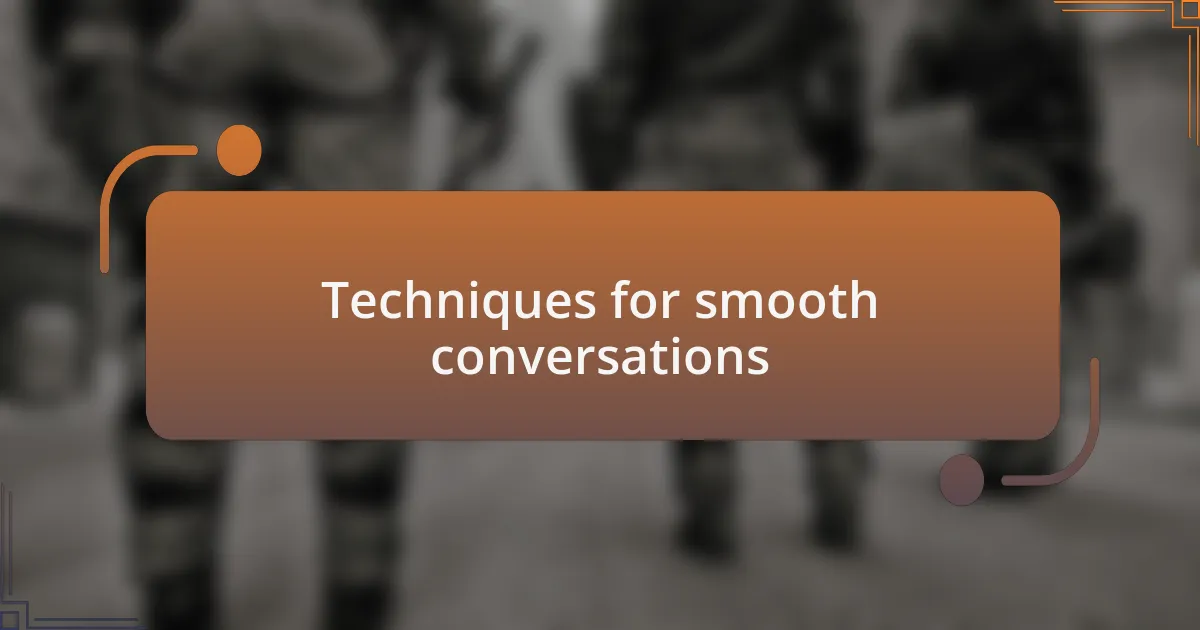
Techniques for smooth conversations
One technique that consistently helps me navigate difficult conversations is asking open-ended questions. For instance, during a local forum, I asked an opponent, “What experiences have shaped your views on this topic?” This approach not only encouraged them to share their thoughts more deeply but also shifted the focus from debate to dialogue. Have you ever noticed how a simple question can dissolve tension?
Another method I’ve found valuable is to acknowledge emotions, both mine and the other person’s. I recall a tense exchange when I sensed frustration in the air. I paused and said, “I can see this topic evokes strong feelings for both of us.” This acknowledgment brought a moment of clarity, reminding us that we were discussing real lives, not abstract policies. Isn’t it fascinating how empathy can turn a potential conflict into a shared journey towards understanding?
Lastly, maintaining a calm demeanor is crucial. I remember a time when a heated discussion escalated quickly. By taking a deep breath and speaking gently, I was able to diffuse the situation and steer the conversation back to constructive grounds. My calmness seemed to invite others to do the same. Have you ever considered how your tone can influence the entire direction of a conversation?
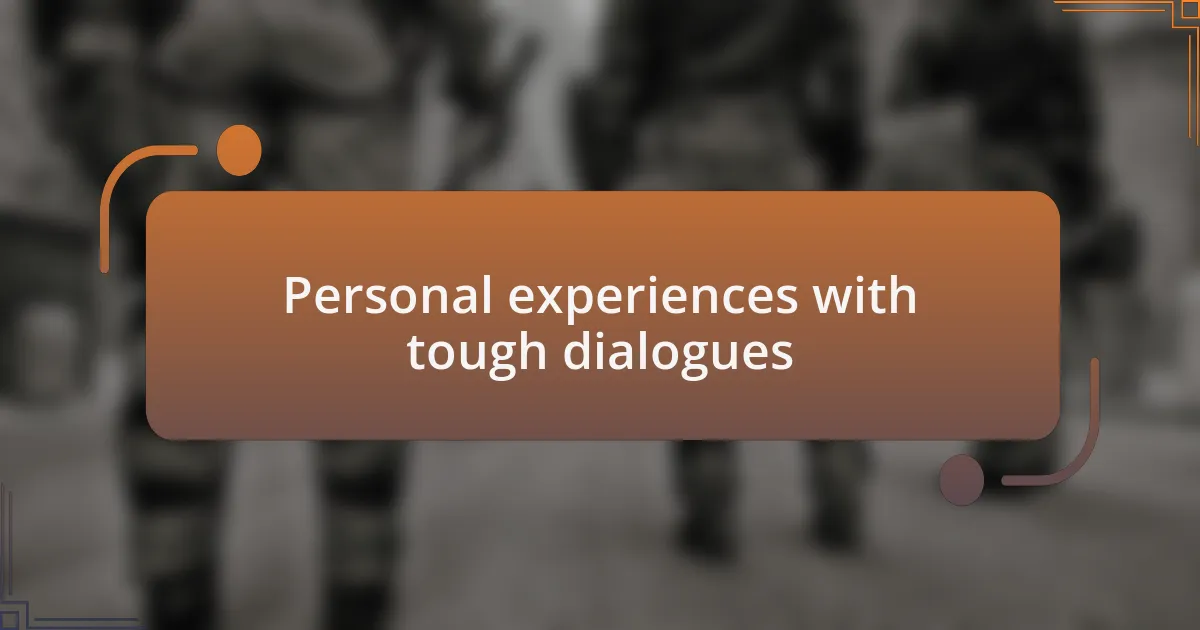
Personal experiences with tough dialogues
Engaging in tough dialogues often brings a mix of emotions, and I’ve experienced this firsthand. During a high school debate competition, I faced a passionate speaker who was adamant about their stance. Instead of diving straight into counterarguments, I shared a personal story about a close friend who faced an unplanned pregnancy. This connection shifted the atmosphere from adversarial to more compassionate. Have you ever found that sharing a piece of your life can change the tone of a tough conversation?
I remember a community gathering where I discussed pro-life issues with a group that had diverse opinions. One individual became quite emotional, sharing their distress over the topic. Rather than dismissing their feelings, I took a moment to listen actively and express that I understood their pain. I asked, “What solutions do you envision for those in similar situations?” This not only validated their emotional response but encouraged more meaningful dialogue. How often do we realize that listening can be as powerful as presenting our own views?
There was a time I found myself in a heated exchange online about pro-life advocacy. The conversation quickly spiraled into personal attacks, and rather than retaliate, I opted to acknowledge the underlying frustration. I simply stated, “It seems we both care deeply about human rights.” This reframing turned the dialogue away from conflict and opened a space for constructive conversation. Can you see how shifting our perspective can completely alter the dynamics of a tough dialogue?
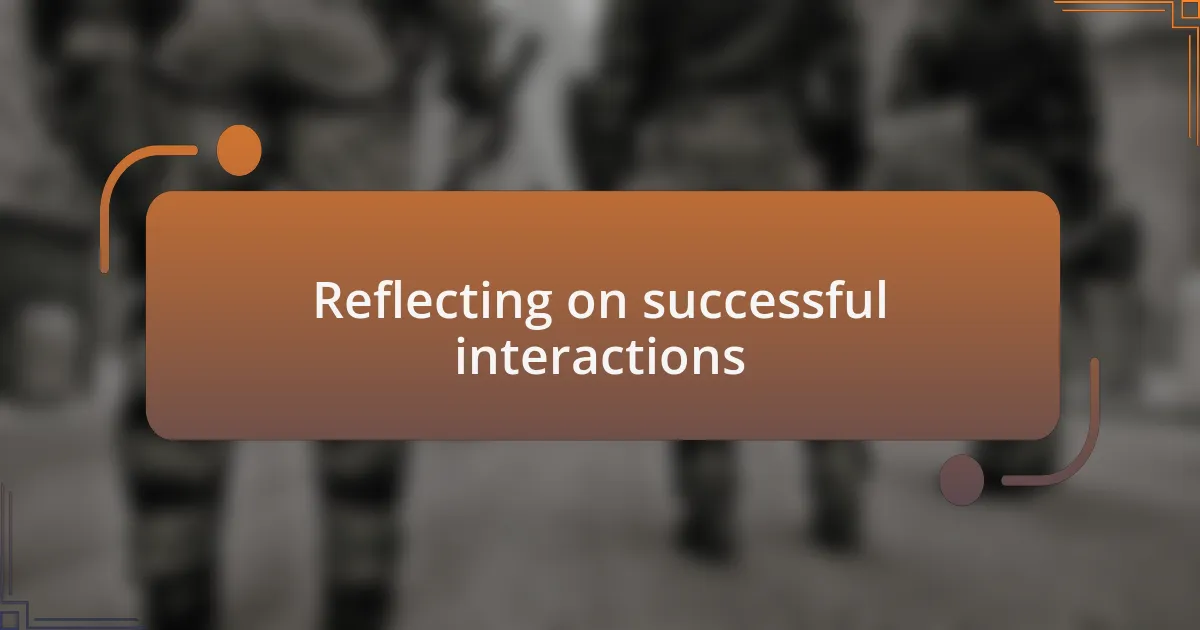
Reflecting on successful interactions
Reflecting on my interactions, I often think about a conversation I had with a friend who initially disagreed with my pro-life stance. We were sitting at a coffee shop, and instead of defending my position aggressively, I asked him about his journey and what had shaped his views. This soft approach allowed us not only to understand each other better but also to find common ground that we both valued—namely, a desire to protect vulnerable individuals.
Another memorable encounter happened at a local panel discussion. I found myself speaking with someone who had a personal experience that influenced their perspective greatly. Rather than pushing back immediately on their arguments, I shared my own concerns about the emotional implications of their stance. This pivot led to a heartfelt exchange where both of us could express our fears and hopes, ultimately bridging the gap between us. Have you ever noticed how vulnerability can open doors previously thought to be closed?
In reflecting on these successful interactions, it’s clear that approach matters deeply. When the focus shifts from ideology to empathy, the tone changes dramatically. One day, during an online discussion, I was faced with animated critiques. Instead of rising to the occasion, I remembered to focus on shared values. I questioned, “What do we both hope for in this discussion?” By redirecting the conversation towards our common goals, I found that collaboration became far more attainable. Isn’t it fascinating how a simple shift in focus can lead to profound understanding?
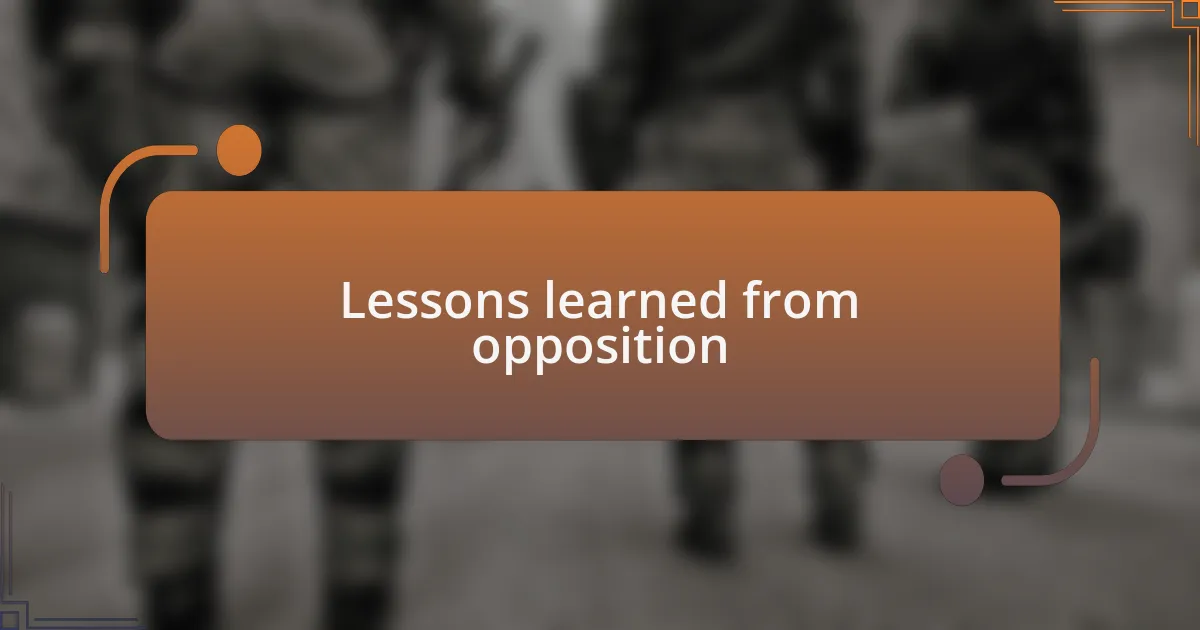
Lessons learned from opposition
When I encountered opposition during a community event, I learned the value of active listening. One participant launched into a passionate critique of pro-life policies, and instead of reacting defensively, I simply listened. This taught me that sometimes, the strongest response is to validate someone’s feelings before presenting my own perspective. Have you ever felt that tension dissolve just by being heard?
During a debate on social media, I came across an exchange that escalated quickly. Rather than retaliate with facts, I recalled my own doubts and struggles with the issue. Sharing my personal journey made the conversation more relatable, turning a potential conflict into a dialogue. This experience reminded me that honesty can disarm hostility, creating room for empathy and understanding.
Reflecting on these moments, I realized that opposition is often an opportunity for growth. One conversation at a town hall meeting led me to examine how my beliefs might be perceived by others. I wondered, “How can I express my views without alienating those who differ?” This shift in perspective not only strengthened my arguments but also enriched my understanding of the diverse narratives that exist within the pro-life movement.